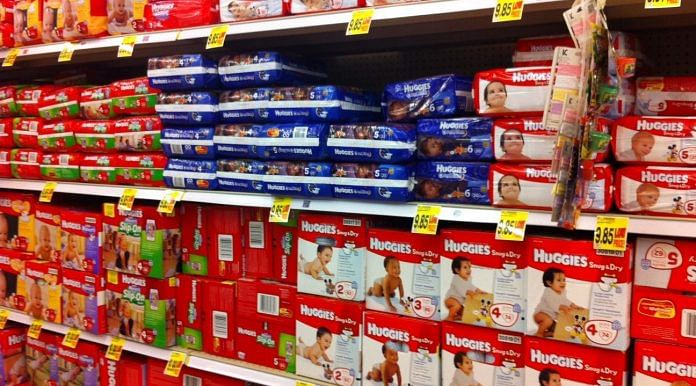New Delhi: The presence of toxic chemicals called phthalates in disposable baby diapers is concerning, as they are hazardous to the health of young children, reveals a Delhi-based study.
Published Monday by Toxics Link, an Indian environmental and advocacy organisation, the study establishes that most diapers available in the Indian market contain harmful phthalates like DEPH and DBP that can lead to “irreversible impact” on children’s health.
The research was conducted on 20 samples from 19 brands available at chemist shops and on e-commerce websites, including well-known ones such as Pampers, Huggies, Himalaya and Patanjali. Most of these products do not feature any material labelling.
The study found that the most harmful phthalate, DEHP, was found between the range of 2.36ppm and 264.94ppm (parts per million) in all the samples. The total number of phthalates were present in the range of 8.2ppm to 302.25 ppm in all the samples.
Also read: Govt wants to merge allopathy, homoeopathy, Ayurveda into one health system, plans 2030 launch
What are phthalates
Diapers are made up of special polymer materials, including cellulose, polypropylene, polyester and super absorbent polymer (SAP), which are arranged in different layers. Among these polymers, phthalates are generally used as plasticisers, which add flexibility and durability to the product.
The study explains that phthalates are well-known “endocrine disrupting chemicals (EDCs)” that disrupt the functioning of hormones and affect human health, especially children, who are most vulnerable to its exposure.
“Ideally there should be no phthalates present in the diapers. But as an alternative, plant-based phthalates such as adipates, benzoates and bio-based plasticisers can be used by the manufacturers of these diapers,” Alka Dubey, member of the research team and programme coordinator at Toxics Link, told ThePrint.
The study says that although there are regulations in place for phthalates in plastic toys in India, there are no such regulations for diapers.
“In Korea, Korean Ministry of Food and Drug Safety (MFDS) regulates baby and adult diapers under ‘Sanitary Products’. Even in Japan, phthalates are classified as prohibited chemical substances and are not allowed to be used in manufacturing of diapers. However, no specific guidelines are applicable on diapers in India,” explained Dubey.
DEHP, BBP, DIBP and DBP, which are commonly used in the manufacturing of diapers, are highly hazardous especially for children, the study says. “Therefore they are banned or restricted in children’s toys, baby care products, cosmetics, and medical devices etc in EU, US and few other developed countries. In India, too, these phthalates are restricted in children’s toys.”
Also read: Depression, OCD, loss of sleep — Covid has made everything worse, but there are ways to cope
Possible link to breast cancer, obesity, diabetes
Other scientific studies have also revealed that phthalate exposure may be associated with diabetes and insulin resistance, breast cancer, obesity, metabolic disorders, and poor immune function.
The study also quotes other research to corroborate its result that exposure to phthalates can lead to irreversible impact on children’s health, leading to asthma and respiratory allergies in children who had prenatal exposure to higher molecular weight phthalates.
“Children are more vulnerable to phthalate exposures because of their hand-to mouth behaviors, floor play, and developing nervous and reproductive systems. Phthalates in disposable diapers are also a concern for babies as diapers are in direct contact with their skin for a long period of time each day for 2-3 years”, it states.
Senior programme coordinator at Toxics Link Piyush Mohapatra told ThePrint that despite being banned in various countries in the world, phthalates purely continue to being used in diapers in India due to lack of awareness and policy. “The soiled diapers, which are dumped in landfills and garbage-bins, are the source of phthalates in the environment, and generate huge waste. Phthalates with higher molecular weight such as DHP, DOP, DEHP etc are less susceptible to biodegradation,” he adds.
Also read: Sufficient Vitamin D levels can prevent severity of Covid infection — Boston University study



